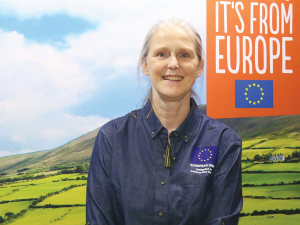Damien O’Connor: NZ united on global trade
When it comes to international trade, politicians from all sides of the aisle are united, says Labour's trade spokesman Damien O'Connor.
 EU ambassador Nina Obermaier is hopeful that the FTA negotiated last year will be fully signed off by the middle of the year.
EU ambassador Nina Obermaier is hopeful that the FTA negotiated last year will be fully signed off by the middle of the year.
The European Union's ambassador to NZ, Nina Obermaier, is hopeful that the FTA negotiated last year will be signed off by the middle of this year.
While there has been agreement between representatives of the two parties, the FTA requires final sign-off by their respective parliaments. In the case of the EU, this is far more complicated than it is in NZ. Firstly, it has to undergo a 'legal' review and then the agreement that has to be translated into the 24 official languages of the EU so that all their parliamentarians can approve it.
Obermaier says this is now in the process of being done and hopefully the FTA will be formally approved in July this year.
"The FTA will bring our relations to a whole new level. It's not the signature necessarily but the entry in force which will happen in 2024 if all goes well," she told Rural News.
"What we will see, and this is what we have seen with other FTAs, is that trade will grow by around 30% and investment at an even greater rate, so we are looking at an increase of roughly 80%."
Obermaier says Fieldays was so important because EU investors are looking at sustainable opportunities for investment. She believes there are lots of wonderful projects here in NZ.
"We think there are massive opportunities. We are aware that there is disappointment in some sectors about the FTA," she told Rural News. "However, this (the FTA) goes way beyond dairy and beef access. We are a market of 440 million consumers and when it comes to horticulture, honey, seafood and timber more than 99% of these products into the EU will be tariff free from day one."
Obermaier believes the FTA will strengthen the political relationship between the two parties and says this has happened with NZ's swift response to supporting the EU in respect of Ukraine.
Fonterra’s impending exit from the Australian dairy industry is a major event but the story doesn’t change too much for farmers.
Expect greater collaboration between Massey University’s school of Agriculture and Environment and Ireland’s leading agriculture university, the University College of Dublin (UCD), in the future.
A partnership between Torere Macadamias Ltd and the Riddet Institute aims to unlock value from macadamia nuts while growing the next generation of Māori agribusiness researchers.
A new partnership between Dairy Women’s Network (DWN) and NZAgbiz aims to make evidence-based calf rearing practices accessible to all farm teams.
Despite some trying circumstances recently, the cherry season looks set to emerge on top of things.
Changed logos on shirts otherwise it will be business as usual when Fonterra’s consumer and related businesses are expected to change hands next month.

OPINION: Here w go: the election date is set for November 7 and the politicians are out of the gate…
OPINION: ECan data was released a few days ago showing Canterbury farmers have made “giant strides on environmental performance”.